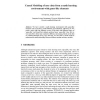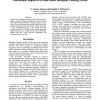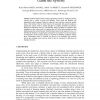234 search results - page 15 / 47 » Detecting Student Misuse of Intelligent Tutoring Systems |
UMUAI
2008
13 years 7 months ago
2008
Abstract. Self-efficacy is an individual's belief about her ability to perform well in a given situation. Because selfefficacious students are effective learners, endowing int...
AIED
2011
Springer
12 years 11 months ago
2011
Springer
We have created a math learning environment with game-like elements such as narrative, visual feedback, personalization, collection, etc. We made a study with four different versio...
FLAIRS
2011
12 years 11 months ago
2011
iSTART is an intelligent tutoring system (ITS) designed to improve students’ reading comprehension. Previous studies have indicated that iSTART is successful; however, these stu...
AIED
2005
Springer
14 years 1 months ago
2005
Springer
Students approach the learning opportunity offered by intelligent tutoring systems with a variety of goals and attitudes. These goals and attitudes can substantially affect student...
AIED
2007
Springer
14 years 1 months ago
2007
Springer
: This paper proposes the notion of problem templates (PTs), a concept based on theories of memory and expertise. These mental constructs allow experts to quickly recognise problem...



